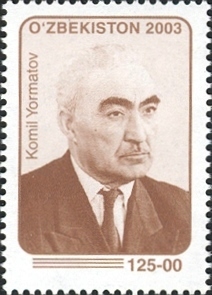Kamil Yarmatov
Kamil Jarmatowitsch Jarmatow ( Russian Камиль Ярматович Ярматов , Uzbek Komil Yormatov ; born April 19 . Jul / 2. May 1903 greg. In Kanibadam , Russian empire , today Tajikistan ; † 17th November 1978 in Tashkent , USSR ) was a Soviet film director.
Life
Yarmatow came from an Uzbek family from Kanibadam in what is now Tajikistan. After graduating from school, Yarmatov went to Moscow in the 1920s , where he initially studied at the State University of Transportation . At the same time he attended acting courses and finally switched to the renowned Gerasimow Institute for Cinematography . He completed his studies there in 1931.
Kamil Jarmatow made his directorial debut in 1932 with the film "Emigrant", a Tajik film production. In the next few years, Yarmatov's numerous other directorial works followed, and he occasionally appeared as an actor. In 1940 he received an award for his work for the first time, the Badge of Honor of the Soviet Union . One of his best-known films was the monumental film The Poet Alischer Nawoi , released in 1948 , which was made by Uzbekfilm in Tashkent . Also in 1948 he received the Stalin Prize, which was abolished a few years later . In 1956 his film Awizenna was released . In 1959, Yarmatov was honored as a People's Artist of the USSR .
Yarmatov died in Tashkent in 1978.
Filmography (selection)
- 1939: Drusja wstretschajutsja wnow ( Друзья встречаются вновь )
- 1948: The poet Alischer Nawoi ( Алишер Навои )
- 1956: Avizenna ( Авиценна )
- 1964: On the horses, jigites ( Буря над Азией )
- 1969: Rider of the Revolution ( Всадники революции )
- 1970: The Downfall of the Black Consul ( Гибель чёрного консула )
- 1976: distant near years ( Далёкие близкие годы )
Web links
- Kamil Jarmatow in the Internet Movie Database (English)
| personal data | |
|---|---|
| SURNAME | Yarmatov, Kamil |
| ALTERNATIVE NAMES | Jarmatow, Kamil Jarmatowitsch (full name); Ярматов, Камиль Ярматович (Russian); Yormatov, Komil (UzS) |
| BRIEF DESCRIPTION | Soviet film director |
| DATE OF BIRTH | May 2, 1903 |
| PLACE OF BIRTH | Kanibadam , Russian Empire |
| DATE OF DEATH | 17th November 1978 |
| Place of death | Tashkent , USSR |
